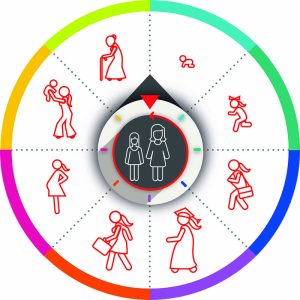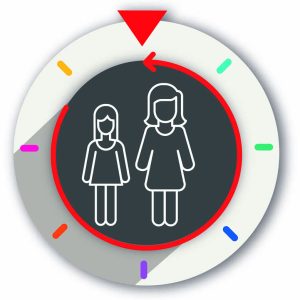
Christina Burgess, director and founder of the Haemophilia and Bleeding Disorders Counselling Association (HBDCA), discusses the psychological challenges women and girls living with a bleeding disorder may experience during different life stages.
Alongside their bleeding disorder, many women and girls also experience psychological impacts. This is especially the case when they reach important milestones in their lives such as puberty, starting school and college, entering the workplace, embarking on sexual relationships, the journey to motherhood and childbirth, experiencing the menopause (Khair et al, 2022; Noone et al, 2019).
The reasons for this impact are many and varied but can comprise all or some of the following: a lack of awareness or knowledge by the general public that women have bleeding disorders, and even many medical professionals do not recognise that their female patients might have a bleeding disorder leading to possible late diagnoses or no diagnosis, sometimes until post-childbirth (Khair et al, 2022).
Delayed diagnosis may occur at the very stage when a young girl is feeling particularly psychologically vulnerable, at puberty or post-puberty. For even without a bleeding disorder, girls during puberty can experience a lack of confidence, feelings of shame and a need to keep their menstrual bleeding secret.
Add to this the issues severe menstrual bleeding can bring, including leakage during class, being singled out by teachers due to requiring more bathroom visits during lessons, judgement from peers including from the opposite sex, and one can begin to appreciate the psychological impact all these will have (Khair et al, 2022).
Stigma is also experienced by women due to familial/societal taboos. This can bring with it a crisis of self-image, a fear of rejection, a fear of intimacy and relationship issues, especially when considering disclosing the bleeding disorder to a new partner or when considering parenthood. There is also the fear of being judged, or discriminated against, at school, at university or in the workplace (Khair et al, 2022; Noone et al, 2019).
Data has indicated that females with a bleeding disorder are diagnosed much later than males with a bleeding disorder (Noone and d’Oiron, 2022)
A key indicator that there might be a bleeding disorder, severely heavy periods, is frequently considered normal so diagnosis may be missed. To compound this, many women feel too embarrassed to speak about heavy menstrual bleeding to male healthcare professionals and, therefore, may not disclose to them just how debilitating this issue is for them or the major impact this is having on their lives (Khair et al, 2022).
This situation can also be exacerbated by women and girls’ own relatives telling them that heavy periods are the norm within their family. Menstrual bleeding is often not a subject for discussion outside one’s own family so women and girls come to believe that this must be normal and endeavour to endure this severe bleeding in silence instead.
They might also be made to feel that they are a lesser woman than others because they struggle with these issues rather than just putting up with them. They are often made to feel weak, believing that they have failed somehow as a woman and that they should be able to deal with this without complaint.
Even in today’s modern world, there is still frequently a societal taboo about speaking about periods with this being an even more difficult taboo to break if the woman or girl is from a background, culturally, where women’s issues are not spoken about at all (Khair et al, 2022).

In a school or college setting or in the workplace, girls and young women can be made to feel embarrassed, or are singled out among classmates, fellow students or work colleagues.
They may have to drop out of lessons, missing out on vital education. They might need to take days off from work due to the effects of their menstrual bleeding, which might include painful cramps, severe loss of blood over weeks rather than days, and the increased possibility of anaemia.
They frequently live with the anxiety that they may get into trouble at school, be dropped from their college course, or be in danger of losing their job, particularly if there is little understanding or support shown to them by their teacher, college course leader or employer (Khair et al, 2022).
Women and girls may experience dental issues, such as bleeding gums on a daily basis or longer bleeding after dental procedures. They may also bruise easily with people misconstruing that they might be being abused by a boyfriend or partner. Bleeding gums, constant nosebleeds and visible bruising on arms and legs all contribute to a lack of self-image and lack of confidence and a perception that people are looking at them and judging them due to these physical symptoms (Khair et al, 2022).
When entering into a new relationship, women and girls often find it difficult to disclose their bleeding disorder to their partner for fear of rejection. There can be great anxiety experienced around sexual intimacy and sexual relationships.
Women can feel embarrassed and mortified if they bleed during, or after, sexual intercourse, for instance. There are also young women who, having had a long-term relationship, have then been abandoned by their partner at the stage where starting a family is considered. Their partner has not been able to contemplate the possibility of having a child with a bleeding disorder, if the young woman is a “carrier”. This will be devastating for that young woman.
Sadly, this may happen more than once, generating a real fear for these women that they may never have a child. This can increase in them abandonment and trust issues. It is, therefore, essential to provide tailored information and support to partners so that they can be reassured and have confidence regarding parenthood, hopefully encouraging them to remain in the relationship (Khair et al, 2022; Noone et al, 2019).
Clear information is essential

It is paramount that women and girls who are considering motherhood, or who are pregnant, are given clear information about their pre-natal journey so they can make informed decisions about their care, including whether to undergo genetic counselling.
It is also paramount that their bleeding disorder is taken into account by healthcare professionals when formulating their birth plan and any ensuing post-natal care once the baby is born. It is essential that the haemophilia department, gynaecological and obstetrics departments all collaborate and communicate closely with each other in order to ensure a coordinated approach and create a care plan, leaving nothing to chance (Janbain and Kouides, 2022).
Healthcare professionals also need to recognise that issues may arise when a woman comes off successful treatment when trying to start a family. The amended treatment can see a return to heavy menstrual bleeding more difficult to control. This can create a psychological tumult while these women return to navigating the rollercoaster of severe periods and other debilitating side-effects. They may have to experience these symptoms for a few years prior to the attempt at becoming pregnant succeeding.
There is also the question about female carriers to be considered, whether symptomatic or asymptomatic. Thankfully, there has been a move in recent times to rename women who are carriers according to the levels of factor in their blood i.e. a person with mild haemophilia. For the term ‘carrier’ in no way describes their situation or the psychological issues they may face.
Even without physical symptoms, a carrier may experience intense feelings of guilt that they have passed a bleeding disorder onto their child. This seems exclusively an issue for girls and women as it is rare that this context is questioned when men with haemophilia pass the bleeding disorder gene to daughters (Sanigorska et al, 2022; Van Galen et al, 2021).
Menopause misconceptions
For older women, the menopause, and its uncertainty, is also a stage in their lives, that is often neglected. There may be a misconception that for these women the menopause means menstrual issues go away, whereas in fact they might actually worsen, particularly in the peri-menopausal phase.
Nurses, and the multidisciplinary team, should remain vigilant to ensure this cohort does not fall through the gap. Collaboration between the haemophilia department and the gynaecology department is key to optimal care.
It is also important that, in advance of the menopause, women are provided with timely, relevant, well-written information in order to help them to be aware of, and to prepare for, any upcoming changes. Any support they need, including psychological support, should be provided to them throughout this major transition in their lives (Radhakrishnan and d'Oiron, 2022).
Data has indicated that females with a bleeding disorder are diagnosed much later than males with a bleeding disorder (Noone and d’Oiron, 2022)
Conclusion
Psychological support, in an ideal world, should be made available at all the different stages outlined above. Some women are able to navigate these various stages without requiring psychological support whereas many may find it hugely beneficial.
It may be the only place they are able to speak freely about the anxiety, worries or depression they may be experiencing. These emotions can often be triggered by having difficulty in conceiving, by having had multiple miscarriages or by having had sexual intimacy and relationship issues.
Women and girls may feel they do not have a voice or a say in the management of their own bleeding disorder. They may also feel that their issues go unrecognised by everyone around them, including family members and healthcare professionals.
It is, therefore, essential that women and girls are given information by Haemophilia Centres and members of the multidisciplinary team about any psychological/psychosocial support that might be available as they may not know how to source this support themselves.
Proactive, collaborative, vigilant nursing at each stage in a girl or woman with a bleeding disorder’s life, where nurses are aware of, and can recognise, psychological trigger points, will have a very positive impact, not only on their physical wellbeing but, importantly on their psychological wellbeing, too. Psychological support can help these women to feel validated and to process the impact they have experienced so that they have an increased quality of life.
Communication, therefore, between all members of the multidisciplinary team, including the nurse and the psychologist, and all the different departments involved, is absolutely essential for an optimum holistic package of care for this potentially vulnerable cohort.
CSL Behring’s commitment to supporting healthcare professional education

CSL Behring is a global leader in the plasma protein biotherapies industry. We research, develop, manufacture and market biotherapies, which are used to treat serious and rare conditions.
As part of our commitment to supporting health professionals to care for patients with rare disease, we have developed a number of online educational resources in collaboration with experienced healthcare professionals.
The Bleeding Disorders Academy, which provides a comprehensive introduction to haemophilia and von Willebrand disease, as well as a series of CPD accredited modules, is open to all UK health professionals.
Register to listen to Christina Burgess and Lisa Fowler of the Haemophilia and Bleeding Disorders Counselling Association (HBDCA) discuss the psychological challenges faced by women with bleeding disorders during different life stages.
Register: www.bleedingdisordersacademy.co.uk
HBDCA was founded in 2018 to provide free psychological care for people affected by a bleeding disorder, and their family and caregivers.

Find out more at www.hbdca.org.uk
References
Janbain M, Kouides P (2022) Managing pregnant women with hemophilia and von Willebrand disease: how do we provide optimum care and prevent complications? International Journal of Women's Health; 14: 1307-1313.
Khair K et al (2022) The views of women with bleeding disorders: Results from the Cinderella study. Haemophilia; 28: 2, 316-325.
Noone D et al (2019) Barriers and challenges faced by women with congenital bleeding disorders in Europe: Results of a patient survey conducted by the European Haemophilia Consortium. Haemophilia; 25: 3, 468-474.
Noone D, d’Oiron R (2022) Monitoring to improve quality of life in women with bleeding disorders.The Journal of Haemophilia Practice; 9: 1, 121-125.
Radhakrishnan S, d’Oiron R (2022) Ageing and women with bleeding disorders. The Journal of Haemophilia Practice; 9: 1, 126-13.
Sanigorska A et al (2022) The lived experience of women with a bleeding disorder: A systematic review. Research and Practice in Thrombosis and Haemostasis; 6, 1: e12652.
Van Galen KPM et al (2021) A new hemophilia carrier nomenclature to define hemophilia in women and girls: Communication from the SSC of the ISTH. Journal of Thrombosis and Haemostasis 19; 8, 1883-1887.
GBR-OTH-0823
Prepared September 2023
 Nursing Times Resources for the nursing profession
Nursing Times Resources for the nursing profession



Have your say
or a new account to join the discussion.